Grundläggande kvantmekanisk behandling av material som ger förstärkning i olika lasersystem som t ex atomer, molekyler och fasta kroppar.
Grundkunskap om de komponenter som ingår i en laser.
Ljusets kvantegenskaper och dess växelverkan med materia.
De fysikaliska principerna för laserns funktion.
Kvantförstärkares och laserns grundläggande egenskaper.
Översikt över de viktigaste lasertyperna.
